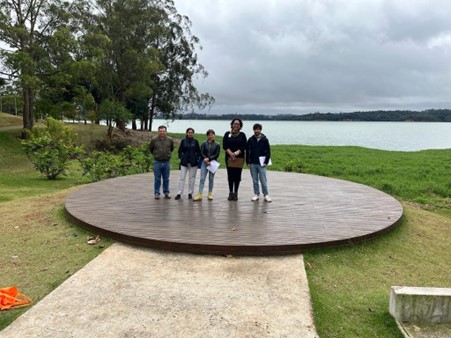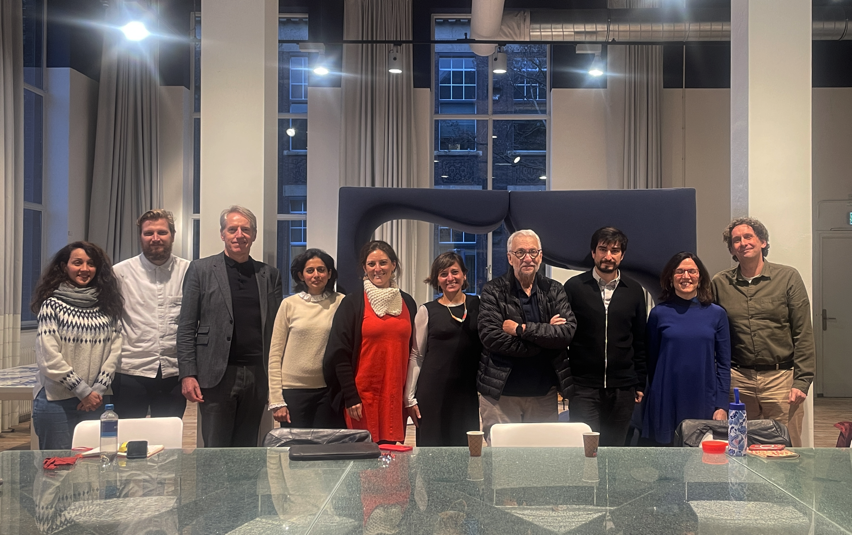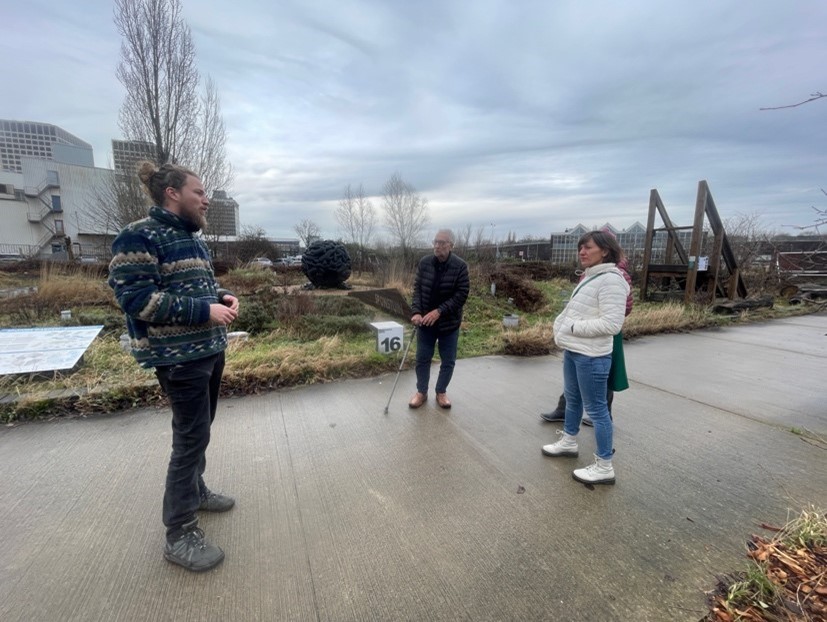Making Green Work for Health
Victor Muñoz Sanz, Assistant Professor at the Faculty of Architecture of TU Delft and Paulo Hilário Nascimento Saldiva, Professor of the Department of Pathology at the Faculty of Medicine of the University of São Paulo (FMUSP) were granted a SPRINT award to pioneer research endeavours to bring to the stage new knowledge and practices at the intersection of urban greening, health, and inclusive economic opportunities—local economies of green care.
The initial stage of the project entailed arranging research exchanges with two main workshop activities, to emphasise the purpose and relevance for future (joint) research. The project involved the organisation of two seminars, workshops and field visits in São Paulo and The Netherlands. For these activities, the two researchers collaborated with Laura Janka Zires, Architecture Hub Coordinator of the Cities Lab of Insper in São Paulo. The first activity was a three-day-long programme at USP and Insper in São Paulo in September 2023 to explore existing initiatives that intersect urban health, urban greening and social equity. At TU Delft, the second activity took place in February 2024 in the form of an three-day programme to present results and exchanges with other initiatives both from the Global South and Europe to discuss their relevance for an international context and new avenues for future research.
SÃO PAULO
In September 2023, the first international seminar on “Making Green Work for Health” took place in São Paulo, organised by Prof. Saldiva, Assistant Professor Muñoz Sanz, and Laura Janka Zires, hosted by the Institute for Advanced Studies of USP and Insper Institute of Education and Research in São Paulo. Deepti Adlakha, Associate Professor of Urban Health at TU Delft joined the Dutch delegation. The seminar featured discussions on existing studies and strategies, attracting participants from various sectors including civil organisations, public policy organisations, and academia, including Gilberto Natalini, Secretary of Climate Change of São Paulo (until January 2024). The seminar was recorded and is available in the YouTube channel of the Institute for Advanced Studies of USP.
The seminar was followed by a workshop, in which attendees collaborated on designing an international research project for scientific exchange, collaboration, and mutual learning between Brazil and The Netherlands. The interdisciplinary research exchange aims to uncover innovative policies, organisational models, and core design criteria to enhance the concept of urban greening projects within local green care economies. Thanks to the diverse range of contributions and debates, the workshop proved to be a valuable experience for Muñoz Sanz and his team, who spent nearly a week in São Paulo collaborating with researchers from USP and Insper.
After the seminar and workshop session, the following two days included visits to green spaces like Cantinho do Céu linear park and Parque Augusta in São Paulo. Parque Augusta, managed by Heraldo Guiaro, stands as a symbol of popular mobilisation for urban public space. Guiaro emphasised the importance of showcasing how nature is integrated into urban life, especially considering São Paulo's uneven forestation, which affects microclimates and public health. A more detailed account of the exchange activities in São Paulo can be found in this piece of news published by Insper.
Delft
In February 2024, the second research activity, organised by the Section of Urban Design of the Department of Urbanism, in collaboration with the University of São Paulo, Insper, and BK’s Urban Health Seminar Series took place at the Faculty of Architecture at TU Delft. The Symposium began with opening remarks delivered by Machiel van Dorst, Professor of Environmental Behaviour and Design, and the Urban Studies Section Leader at the Department of Urbanism. The first panel offered insights into the theme of “Green health. Addressing urban greening from the perspectives of human and more-than-human health.” Presenters included Prof. Paulo Saldiva, Cecil Konijnendijk, Co-Director of the Nature Based Solutions Institute and Honorary Professor of Urban Forestry at the University of British Columbia and Paulina Achurra, Professor of Engineering at Insper São Paulo. René van de Velde, Associate Professor of Urban Forestry and Landscape Architecture at TU Delft, provided a response to the presentations.
In the seminar's second part, the focus shifted to "Greening Policy. Exploring urban greening at the intersection with inclusiveness, justice, and livelihoods." The panel counted with presentations by Sara Romero, Assistant Professor and PhD Candidate at the Technical University of Madrid, Maikel Lieuw-Kie-Song, specialist in employment and public investment at the International Labour Organization, Camiel Dijkers, Project Manager of Groen/Blauw at Gemeente Almere and Laura Janka Zires, Planning Director at the Planning Institute of Fortaleza and Architecture Hub Coordinator at Cities Lab, Insper, São Paulo. The recordings of the seminar will be available shortly in the website of the Section of Urban Design at TU Delft.
The panels were followed by a work session touching on the topics of Urban Health, Urban Design, and Economy and Public Policy, which aimed to identify gaps, define future research questions, add potential partners and chart a specific roadmap for advancing the project, including the exploration of targeted funding proposals.
After the seminar, the Brazilian delegation embarked on field trips to discover exemplary practices in The Netherlands. Among these, they ventured to Maximapark in Utrecht, where they were received by Johan Berghaus, project manager of spatial development at the Municipality of Utrecht. Additionally, the group explored Voedseltuin, with the garden coordinator Tom Lorier. Another visit was to the re-naturalised playground at Basisschool De Provenier, guided by Ian Mostert, the project leader at Kind en Natuur by IVN (Instituut voor natuureducatie en duurzaamheid).
Conclusion
Making Green Work for Health has fostered a successful collaboration between TUD-BK, USP, and Insper. The specific outcome of the exchange will be twofold: first, to co-write and publish a research agenda informing future policies regarding urban green and its impact on human and non-human health; second, to co-develop a supplementary research proposal focused on exploring some of the gaps identified and aimed at fostering deeper institutional collaboration between the two universities.



